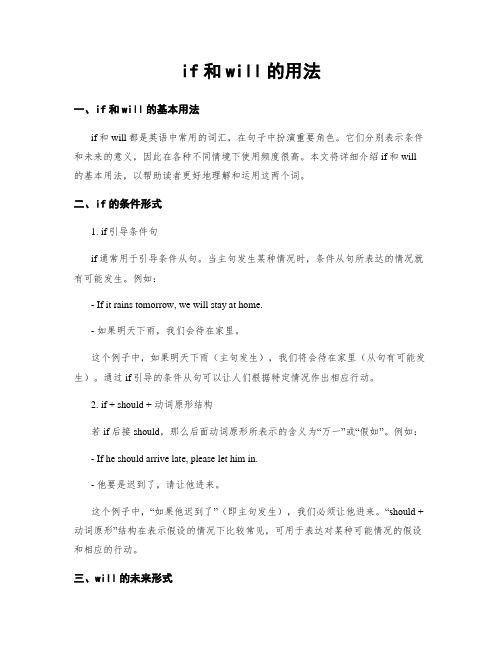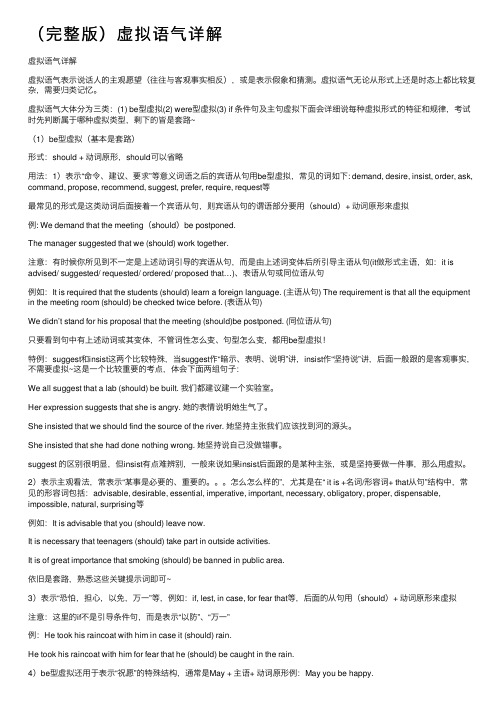if条件句和should的用法
if虚拟语气的用法归纳

if虚拟语气的用法归纳IF虚拟语气是英语中的一种重要语法现象,主要用于表示与现实相反的假设、愿望、建议等。
它分为两种形式:if条件句和if非条件句。
以下是对IF虚拟语气用法的详细介绍:一、if条件句1. 表示与现在事实相反的假设:If + 主语+ 过去时态,主语+ would/could/might/should + 动词原形。
例如:If I were you, I would go to the party.(如果我处在你的位置,我会去参加派对。
)2. 表示与过去事实相反的假设:If + 主语+ had done,主语+ would/could/might/should + have done。
例如:If he had come to the meeting, he would have known the plan.(如果他参加了会议,他就会知道这个计划。
)二、if非条件句1. 表示建议、劝告:主语+ should/would/might/ought to + 动词原形。
例如:You should go to the party.(你应该去参加派对。
)2. 表示愿望:主语+ could/would/might + 动词原形。
例如:I wish I were a bird.(我希望我是一只鸟。
)3. 表示假设:If + 主语+ 动词过去式,主语+ would/could/might + 动词原形。
例如:If I had time, I would go to the park.(如果我有时间,我会去公园。
)三、if虚拟语气的特殊结构1. 省略if,将were、had、should等词置于主语之前:主语+ were/had/should + 动词原形。
例如:She were here, she would meet him.(如果她在这里,她会见到他。
)2. 使用倒装结构:were/had/should + 主语+ 动词原形。
if和will的用法

if和will的用法一、if和will的基本用法if和will都是英语中常用的词汇,在句子中扮演重要角色。
它们分别表示条件和未来的意义,因此在各种不同情境下使用频度很高。
本文将详细介绍if和will 的基本用法,以帮助读者更好地理解和运用这两个词。
二、if的条件形式1. if引导条件句if通常用于引导条件从句。
当主句发生某种情况时,条件从句所表达的情况就有可能发生。
例如:- If it rains tomorrow, we will stay at home.- 如果明天下雨,我们会待在家里。
这个例子中,如果明天下雨(主句发生),我们将会待在家里(从句有可能发生)。
通过if引导的条件从句可以让人们根据特定情况作出相应行动。
2. if + should + 动词原形结构若if后接should,那么后面动词原形所表示的含义为“万一”或“假如”。
例如:- If he should arrive late, please let him in.- 他要是迟到了,请让他进来。
这个例子中,“如果他迟到了”(即主句发生),我们必须让他进来。
“should + 动词原形”结构在表示假设的情况下比较常见,可用于表达对某种可能情况的假设和相应的行动。
三、will的未来形式1. 表示未来意义的willwill使用最广泛的含义之一是表示未来。
它可以用于表达预测、打算、意愿或许诺等。
例如:- I think it will rain tomorrow.- 我认为明天会下雨。
这个例子中,我们根据自己的判断认为“明天会下雨”。
will在此处表示一种根据事实或判断得出来的结论。
2. 请求、邀请和建议中使用will除了表示未来意义外,will还可以用于请求、邀请和建议等场合。
例如:- Will you please open the window?- 请你把窗户打开好吗?这个例子中,“请你把窗户打开好吗?”是一种礼貌而客气地请求,使用will可以使语气更加委婉。
if引导虚拟语气的用法

if引导虚拟语气的用法1、表示与现在事实相反的情况:从句:If主语+过去时(Be动词用were)主句:主语+XXXdoeg:1.If I were you,I would take an XXX.如果我是你,我会带把伞。
(事实:我不可能是你)2.If I knew his telephone number,I would tell you.如果我知道他的电话号码,我就会告诉你。
(事实:不知道)3.If there were no air or water,there would be no living things on the earth.如果没有水和空气,地球上就不会有生物。
(事实:地球上既有空气也有水)4.If I had any money with me,I could lend you some.假如我带钱了,我就会借给你些。
(事实:没有带钱)5.If he XXX,he might pass the exam.如果他再努力些,就能通过考试了。
(事实:没有努力)6.she looked at me as if I had been a stranger.她看我的样子好像我是一个陌生人。
(事实:我并非陌生人)2、表示与过去事实相反的情况从句:If主语+had+done主句:主语+should/would/could/might+have doneeg:1.If I had got there earlier,I should/could have met her.如果我早到那儿,我就会见到她。
事实:去晚了)2.If he had XXX my advice,he would not have made such a XXX.如果他听我的劝告的话,就不会犯这样的错误了。
事实:没有听我的话)3、透露表现对未来情形的客观推测主句:主语+should+do从句:①if+主语+were to do②if+主语+should/would/could/might+do③if+主语+did(动词过去式)/wereeg:1.If he should come here tomorrow,I would talk to him.如果他明天来这儿的话,我就跟他谈谈。
should的用法总结

should的用法总结一、表示建议或提议1. 表示主张、建议、劝告:You should see a doctor if you have a fever. 如果你发烧了就应该看医生。
You should visit the Great Wall if you travel to Beijing. 如果你去北京旅游,应该去参观长城。
2. 表示反驳或提出异议:I don't think you should go out in such bad weather. 我认为天气如此恶劣,你不应该出门。
3. 表示意愿或决心:I should work harder to get a better grade. 我应该更加努力学习以获得更好的成绩。
二、表示命令或强制1. 表示命令或要求:You should apologize to her before it's too late. 你应该在来得及之前向她道歉。
2. 表示责任或义务:You should pay your rent on time. 你应该按时支付租金。
三、表示推测或猜测1. 表示推测、可能性或假设:She should be sleeping now. 她可能现在正在睡觉。
He shouldn't have any trouble passing the exam. 他应该没有通过考试的问题。
2. 表示反问:Shouldn't you be studying for your exam instead of watching TV? 你不该在看电视,应该去备考。
四、表示虚拟语气1. 表示虚拟条件句:If I had more time, I should (would) read more books. 如果我有更多时间,我应该或将会读更多的书。
2. 表示虚拟假设:If I were you, I should (would) take this job. 如果我是你,我应该或将会接受这份工作。
if条件状语从句的用法_If引导的条件状语从句

if条件状语从句的用法_If引导的条件状语从句很多英语学习者都觉得If引导的条件状语从句这个句型很难,学习起来很吃力。
下面是小编为你整理的If引导的条件状语从句的相关资料,希望大家喜欢!If引导的条件状语从句用法1.if引导的条件状语从句可以放在主句之前,也可以放在主句之后,如果放在主句之前,中间要用逗号将主句和从句隔开。
例如:If I am free, I will come to see you.= I will come to see you if I am free.如果我有空,我就来看你。
2. 在含if引导的条件状语从句的复合句中,主句用一般将来时,从句通常用一般现在时态表示将来意义,即主将从现原则。
例如:If it snows tomorrow, we will go skiing.如果明天下雪,我们就去滑雪。
3. 在含if引导的条件状语从句的复合句中,语句的谓语还可含有情态动词can、must、may等,主句也可是祈使句。
例如:If it stops raining, we can go out.如果雨停了,我们就能出去。
4. 在含if引导的条件状语从句的复合句中,如果主句部分描述的是客观事实或真理,要用一般现在时。
例如:If you heat the ice, it turns into water.如果你加热冰,它就会变成水。
if引导的非真实条件句对过去的虚拟条件从句(if):主语+had done 主句might/would/should/could+have done 对现在的虚拟if+ 主语+动词过去式(be用were)主句might/would/should/could+do对将来的虚拟if+主语+动词过去式(be用were)或主语+should do或主语+were to do主句might/would/should/could+doe.g.Tom got to the station in time because he started earlier.If Tom had started late, he would have missed the train.Do you think the thief entered through the door?No, if he had, I don't believe, he would have broken the living room window.If the book weren't so expensive, I would buy it.If you didn't live so far away, we would be able to visit you more.What would you do if you lost your passport in a foreign country?Why hasn't he come? If he should not come on time, we would have to put off the trip.2.注意事项e.g.If she hadn't work hard at English in the past, she wouldn't work as well as a secretary in a large company now. 混合时间的虚拟语气从句为对过去的虚拟,主句是现在。
(完整版)虚拟语气详解

(完整版)虚拟语⽓详解虚拟语⽓详解虚拟语⽓表⽰说话⼈的主观愿望(往往与客观事实相反),或是表⽰假象和猜测。
虚拟语⽓⽆论从形式上还是时态上都⽐较复杂,需要归类记忆。
虚拟语⽓⼤体分为三类:(1) be型虚拟(2) were型虚拟(3) if 条件句及主句虚拟下⾯会详细说每种虚拟形式的特征和规律,考试时先判断属于哪种虚拟类型,剩下的皆是套路~(1)be型虚拟(基本是套路)形式:should + 动词原形,should可以省略⽤法:1)表⽰“命令、建议、要求”等意义词语之后的宾语从句⽤be型虚拟,常见的词如下: demand, desire, insist, order, ask, command, propose, recommend, suggest, prefer, require, request等最常见的形式是这类动词后⾯接着⼀个宾语从句,则宾语从句的谓语部分要⽤(should)+ 动词原形来虚拟例: We demand that the meeting(should)be postponed.The manager suggested that we (should) work together.注意:有时候你所见到不⼀定是上述动词引导的宾语从句,⽽是由上述词变体后所引导主语从句(it做形式主语,如:it is advised/ suggested/ requested/ ordered/ proposed that…)、表语从句或同位语从句例如:It is required that the students (should) learn a foreign language. (主语从句) The requirement is that all the equipment in the meeting room (should) be checked twice before. (表语从句)We didn’t stand for his proposal that the meeting (should)be postponed. (同位语从句)只要看到句中有上述动词或其变体,不管词性怎么变、句型怎么变,都⽤be型虚拟!特例:suggest和insist这两个⽐较特殊,当suggest作“暗⽰、表明、说明”讲,insist作“坚持说”讲,后⾯⼀般跟的是客观事实,不需要虚拟~这是⼀个⽐较重要的考点,体会下⾯两组句⼦:We all suggest that a lab (should) be built. 我们都建议建⼀个实验室。
虚拟语气的用法
虚拟语气的用法虚拟语气主要用在虚拟条件句中,表示根本不存在的情况或可能性很小的假设。
表示对不同时间的假设时,从句的谓语和主语中的谓语的构成是不同的。
有如下几种情况:(一)If条件句中的虚拟语气例句:1)If we had had enough rain last year ,we could have gained a good harvest.句意:如果去年雨水充足的话,我们可能会有一个好收成。
(与过去事实相反)2)If I should see/were to see/saw him tomorrow ,I would invite him .句意:如果我明天见到他,我会邀请他到家里来。
(与将来事实相反)3)If I had enough moneny,I would buy myself a computer.句意:如果我有足够多的钱,群殴讲自己买一台电脑。
(与过去事实相反)(二)主语+ wish + 宾语从句wish+ 宾语从句:现在:过去时(did/were)过去:过去完成时(had done)将来:would/could/might+V.例句:1)I wish I had a car so that I could go home every day句意:希望我有一辆车,这样,我可以回家的每一天2)The program was wonderful. I wish I had seen it.句意:节目很精彩。
我希望我能看到它。
3)Tomorrow is my birthday. I wish you would come to my party.句意:明天就是我的生日。
希望你能来参加我的聚会。
(三)名词性从句的虚拟语气(一二三四)一个坚持:insist两个命令:order, command三个建议:advise, suggest, propose四个要求:demand , require, request, urge虚拟语气即:(should) do,表示坚持、命令、建议、要求某人去做某事。
英语语法虚拟语气用法(if)
虚拟语气虚拟语气用来表达说话人的愿望、请求、建议、假想等不能实现的情况。
1.虚拟语气用于条件句(1)if条件句与现在相反:If I had had a car, I would drive it to Beijing by myself.与将来相反:If I were to do it, I should do it at once.(2)省略if的条件句如果虚拟条件句中含有were\had\should时,if可以省略,这时从句要用倒装语序,把were\had\should移到主语前面。
如Had I known it, I wouldn’t had made such a silly mistake.注意:如果if引导的条件句谓语动词是否定形式,省略if,否定词not 不提前如:Were it not for rain, I would go shopping now.(3)含蓄条件句有是虚拟条件句不一定要用if条件句的形式表达,而是借助介词、介词短语等,常见形式有:without\thanks to\but for\or\otherwise等。
如:But for your help,I could not get home.2.虚拟语气用于名词性从句(1)主语从句It is important\require...+主语从句在这里表示建议,必要,命令等意思的结构中,要用should +动词原形,should可以省略。
这类形容词和分词有:advised\advisable\better\desired\demand\imperative\important\natural\neces sary\ordered\proposed\possible\required\recommended\suggested\urgent\str ange等。
如: It is important (that)we (should) finish the work.(2)宾语从句A: suggest,require,order...+宾语从句在一些表示建议、愿望、要求、请求、劝告、意志、欲望、命令、安排、决定等动词引导的宾语从句中,要用虚拟语气。
If条件状语从句的用法
if引导条件状语从句的用法if 条件句不一般,几个要点记心间;条件句,放在前,逗号要放句中间。
条件句表可能,主句多用将来时;条件句表事实,主句常用现在时。
某事很可能发生,条件是可能存在的,主句中某种情况发生的概率也是很高的。
如:If I have a lot money,I will visit all over the world.如果我很有钱,我将会游遍全世界。
If you fail in the exam,you will let him down.如果你考试不及格,你会让他失望的。
If you have finished the homework,you can go home.如果你作业做完了就可以回家了。
另外,if从句还表示不可实现的条件或根本不可能存在的条件,也就是一种虚拟的条件或假设。
从句多用一般过去时或过去完成时,表示对现在或过去的一种假设。
如:If I were you,I would invite him to the party.如果我是你,我会邀请他参加聚会。
I would have arrived much earlier if I had not been caught inthe traffic.要不是交通堵塞,我本会来得早一些。
另外你还要注意if 条件句的时态搭配1.if从句用一般现在时,主句用一般将来时If he runs he’ll get there in time. 如果他用跑的,他就会及时赶到那儿。
The cat will scratch you if you pull her tail. 如果你拉猫的尾巴,它就会抓你。
2.if从句用一般现在时,主句用may/might/canIf the fog gets thicker the plane may/might be diverted. 如果雾在大一些,飞机可能就会改在别的机场降落。
If it stops snowing we can go out. 如果雪停了,我们就可以出去。
if引导的条件句三种情况
1•对现在虚拟:条件句:一般过去时主句:could/would/+动词原形。
2•对过去虚拟:条件句:过去完成时主句:could/would have done0 3•对将来虚拟:条件句:l.were to do ;2.should do ; 3•—般过去时:主句could/would/+动词原形。
—、对现在情况的虚拟条件从句中谓语动词用一般过去式,主句用,f would/should/might/could+动词原形”形式,表示对现在不可能实现情况的假想。
If I were you,I would choose to work in a small town.如果我是你f我会选择在小城镇工作。
(事实上我不是你)If I had a map now,we could easily get out of the forest.如果现在有地图,我们能很容易地走出森林。
(事实上是现在没有地图)注意:在条件从句中,如果谓语动词是be的形式,不管主语是单数还是复数,书面语中用we©而口语中如果是单数,也可以用was,不过在if I were…中一般用were.If the world were perfect,how could we enjoy the pleasure and comfort of being successful?世界若完美,我们如何能尝到创造成功的快慰?二、对过去情况的虚拟条件从句中谓语动词用过去完成式,主语用,/would/could/should/might+have+动词的过去分词"形式。
If it had not been for your help yesterday^ could not have caught the bus.如]果昨天没有你的帮助,我不会赶上公交车。
(事实是你昨天已经帮助了我,所以我赶上了车)三、对将来情况的虚拟在表示与将来事实相反的条件从句中,谓语动词可用should do,were to do或动词的过去式三种形式表示,但意义略有不同。
- 1、下载文档前请自行甄别文档内容的完整性,平台不提供额外的编辑、内容补充、找答案等附加服务。
- 2、"仅部分预览"的文档,不可在线预览部分如存在完整性等问题,可反馈申请退款(可完整预览的文档不适用该条件!)。
- 3、如文档侵犯您的权益,请联系客服反馈,我们会尽快为您处理(人工客服工作时间:9:00-18:30)。
If 引导条件句的用法1、真实条件句用于陈述语气,假设的情况可能发生,其中if 是如果的意思。
时态关系句型:条件从句主句一般现在时shall/will + 动词原形If he comes, he will bring his violin.典型例题The volleyball match will be put off if it ___.A. will rainB. rainsC. rainedD. is rained答案B。
真实条件句主句为将来时,从句用一般现在时。
注意:1)在真实条件句中,主句不能用be going to表示将来,该用shall, will.(错) If you leave now, you are never going to regret it.(对) If you leave now, you will never regret it.2)表示真理时,主句谓语动词便不用shall (will) +动词原形,而直接用一般现在时的动词形式。
2 非真实条件句1)时态:可以表示过去,现在和将来的情况。
它的基本特点是时态退后。
a. 同现在事实相反的假设。
句型:条件从句主句一般过去时should( would) +动词原形If they were here, they would help you.b. 表示于过去事实相反的假设。
句型:条件从句主句过去完成时should(would) have+ 过去分词If she had worked harder, she would have succeeded.The rice would not have been burnt if you had been more careful.If my lawyer had been here last Saturday, he would have prevented me from going.If he had come yesterday, I should / would have told him about it.含义:He did not come yesterday, so I did not tell him about it.If he had not been ill and missed many classes, he would have made greater progress.含义:He was ill and missed many lessons, so he did not make greater progress.c. 表示对将来的假想句型:条件从句主句一般过去时should+ 动词原形were+ 不定式would + 动词原形should+ 动词原形If you succeeded, everything would be all right.If you should succeed, everything would be all right.If you were to succeed, everything would be all right.3 混合条件句主句与从句的动作发生在不同的时间,这时主,从句谓语动词的虚拟语气形式因时间不同而不同,这叫做混合条件句。
If you had asked him yesterday, you would know what to do now.(从句与过去事实相反,主句与现在事实相反。
)If it had rained last night (过去), it would be very cold today (现在).4 虚拟条件句的倒装虚拟条件句的从句部分如果含有were, should, 或had, 可将if省略,再把were, should或had 移到从句句首,实行倒装。
Were they here now, they could help us.=If they were here now, they could help us.Had you come earlier, you would have met him=If you had come earlier, you would have met him.Should it rain, the crops would be saved.=Were it to rain, the crops would be saved.注意:在虚拟语气的从句中,动词’be’的过去时态一律用"were",不用was,即在从句中be用were代替。
If I were you, I would go to look for him.如果我是你,就会去找他。
If he were here, everything would be all right.如果他在这儿,一切都会好的。
典型例题_____ to do the work, I should do it some other day.A. If were IB. I wereC. Were ID. Was I答案C. 在虚拟条件状语中如果有were, should, had这三个词,通常将if省略,主语提前, 变成were, should, had +主语的形式。
但要注意,在虚拟条件状语从句中,省略连词的倒装形式的句首不能用动词的缩略形式。
如我们可说Were I not to do., 而不能说Weren’t I to do.5 特殊的虚拟语气词:should1)It is demanded / necessary / a pity + that…结构中的主语从句的谓语动词要用should 加动词原形,should 可省略。
句型:(1)suggestedIt is (2)important that…+ (should) do(3) a pity(1)suggested, ordered, proposed, required, demanded, requested, insisted;+ (should) do(2)important, necessary, natural, strangea pity, a shame, no wonder(3)It is suggested that we (should) hold a meeting next week.It is necessary that he (should) come to our meeting tomorrow.2)在宾语从句中的应用在表示命令、建议、要求等一类动词后面的从句中。
order, suggest, propose, require, demand, request, insist, command, insist + (should) doI suggest that we (should) hold a meeting next week.He insisted that he (should ) be sent there.注意:如suggest, insist不表示"建议" 或"坚持要某人做某事时",即它们用于其本意"暗示、表明"、"坚持认为"时,宾语从句用陈述语气。
The guard at gate insisted that everybody obey the rules.判断改错:(错)You pale face suggests that you (should) be ill.(对) Your pale face suggests that you are ill.(错) I insisted that you ( should) be wrong.(对) I insisted that you were wrong.3)在表语从句,同位语从句中的应用在suggestion, proposal, idea, plan, order, advice等名词后面的表语从句、同位语从句中要用虚拟语气,即(should)+动词原形。
My idea is that we (should) get more people to attend the conference.I make a proposal that we (should) hold a meeting next week.could, should和would除了分别是can,shall和will的过去式,还有其他的用法,有人学英语多年还容易将其搞混淆,因此使用时要特别注意:1.could的用法(1)表示惊异、怀疑、不相信等态度:How could John be so arrogant?约翰怎么这么傲慢?He couldn't be over forty. 他不可能有40多岁了。
Where could she be now?她现在能在哪儿呢?以上三个句子可以用can代替could,两者在时间上没有差别,只是用could时语气较缓和,用can时不相信程度更强一些。
(2)比较委婉客气地提出问题或陈述看法:Could(Can) you lend me your walkman?你能把随身听借给我用一下吗?Could I see your credentials?我可以看看你的证件吗?这时could和can没有时间上的差别。
(3)在虚拟条件句中作助动词,与谓语动词一起构成谓语:I could do it (if I would).(假如我愿意的话)我是能办到这一点的。
(指说话人不愿意)You could have done better if you had been more careful. 你要是再细心一点,是可以做得更好的。
2.should的用法(1)表示惊异、赞叹、不满等情绪:It is simply a miracle that rice should grow in such a place. 稻子竟能在这样的地方生长,这实在是个奇迹。
It's wonderful that you should get full marks. 你得了满分真了不起。
Why should you be so late today?你今天怎么来得这么晚?(2)表示委婉地陈述自己的意见:I should think you are right. 我想你是对的。
(3)(表示语气较强的假设)万一,竟然:If he should fail to come, ask Tom to work in his place. 万一他不来,就叫汤姆代替他工作。
